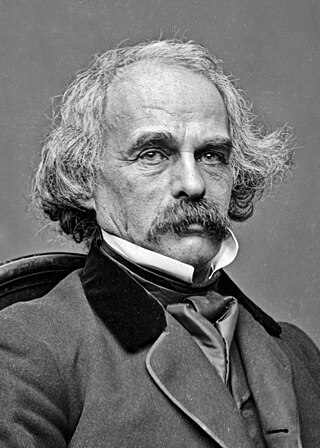
Nathaniel Hawthorne was an American novelist and short story writer. His works often focus on history, morality, and religion.

The Scarlet Letter: A Romance is a work of historical fiction by American author Nathaniel Hawthorne, published in 1850. Set in the Puritan Massachusetts Bay Colony during the years 1642 to 1649, the novel tells the story of Hester Prynne, who conceives a daughter with a man to whom she is not married and then struggles to create a new life of repentance and dignity. As punishment, she must wear a scarlet letter 'A'. Containing a number of religious and historic allusions, the book explores themes of legalism, sin and guilt.
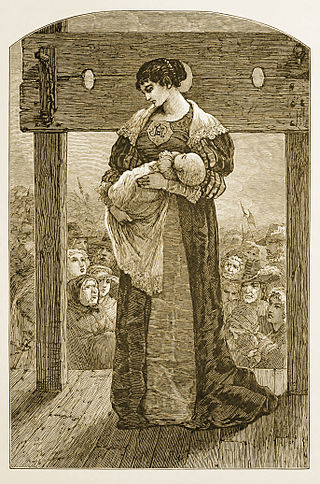
Hester Prynne is the protagonist of Nathaniel Hawthorne's 1850 novel The Scarlet Letter. She is portrayed as a woman condemned by her Puritan neighbors for having a child out of wedlock. The character has been called "among the first and most important female protagonists in American literature".

The Scarlet Letter is a 1995 American romantic historical drama film directed by Roland Joffé. Adapted from Nathaniel Hawthorne's 1850 novel of the same name, it stars Demi Moore, Gary Oldman, and Robert Duvall.

Arthur Dimmesdale is a fictional character in the 1850 romance The Scarlet Letter by Nathaniel Hawthorne. A Puritan minister, he has fathered an illegitimate child, Pearl, with Hester Prynne and considers himself unable to reveal his sin.
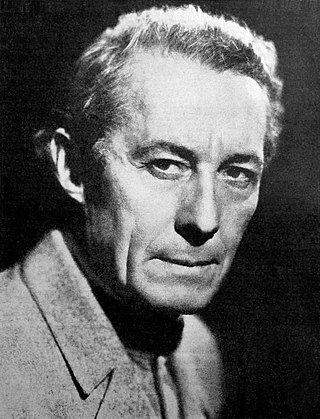
Henry Brazeale Walthall was an American stage and film actor. He appeared as the Little Colonel in D. W. Griffith's The Birth of a Nation (1915).
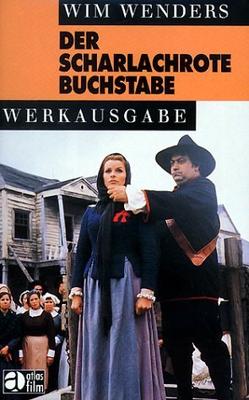
The Scarlet Letter is a 1973 period drama film directed by Wim Wenders, based on Nathaniel Hawthorne's 1850 novel of the same name. The West German-Spanish co-production stars Senta Berger as Hester Prynne, Lou Castel as Reverend Dimmesdale, and Hans Christian Blech as Chillingworth.
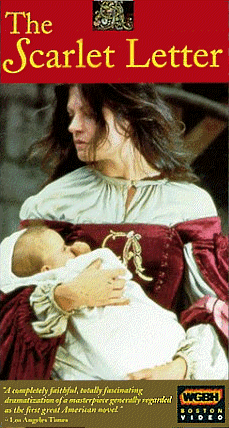
The Scarlet Letter is a 1979 miniseries based on the 1850 novel of the same name by Nathaniel Hawthorne: it aired on WGBH from March 3, 1979 to March 24, 1979. The series is four episodes long, 60 minutes each. Part 2 won the 1979 Emmy Award for Outstanding Video Tape Editing for a Limited Series or Special for film editors Ken Denisoff, Janet McFadden and Tucker Wiard.

"Egotism; or, The Bosom-Serpent" is a short story by Nathaniel Hawthorne published in 1843 in The United States Magazine and Democratic Review in New York.

Roger's Version is a 1986 novel by American writer John Updike.

The Scarlet Letter is a 1926 American silent drama film based on the 1850 novel of the same name by Nathaniel Hawthorne and directed by Swedish filmmaker Victor Sjöström. Prints of the film survive in the MGM/United Artists film archives and the UCLA Film and Television Archive. The film is now considered the best film adaptation of Hawthorne's novel.
Elizabeth Pain, sometimes spelled Elizabeth Paine or Elisabeth Payne, was a settler in colonial Boston who was brought to trial after the death of her child. She was acquitted of the murder charge but found guilty of negligence, fined, and flogged. According to some writers and by popular tradition, aspects of Pain's life and her gravestone are considered an inspiration for the life and grave of character Hester Prynne in the novel The Scarlet Letter by Nathaniel Hawthorne.
The Scarlet Letter (1911) is a silent drama motion picture short starring King Baggot, Lucille Young, and William Robert Daly.

The Scarlet Letter is a 1934 American film directed by Robert G. Vignola and based on the 1850 novel of the same name by Nathaniel Hawthorne.

Ann Hibbins was a woman executed for witchcraft in Boston, Massachusetts Bay Colony, on June 19, 1656. Her death by hanging was the third for witchcraft in Boston and predated the Salem witch trials of 1692. Hibbins was later fictionalized in Nathaniel Hawthorne's famous novel The Scarlet Letter. A wealthy widow, Hibbins was the sister-in-law by marriage to Massachusetts governor Richard Bellingham. Her sentence was handed down by Governor John Endicott.
The Scarlet Letter is a 1922 British silent drama film directed by Challis Sanderson and starring Sybil Thorndike, Tony Fraser and Dick Webb. It is an adaptation of the 1850 novel The Scarlet Letter by Nathaniel Hawthorne.
The Scarlet Letter is a lost 1908 silent American short film, directed by Sidney Olcott. It was based on the 1850 novel of the same name by Nathaniel Hawthorne. The screenplay was written by Gene Gauntier, who also played the character Hester Prynne. The film was produced by Kalem Company.

Richard Saltonstall Rogers was an early American shipping merchant and was possibly the inspiration for a character in Nathaniel Hawthorne's The Scarlet Letter.
The Scarlet Letter is a 2008 opera by Lori Laitman to a libretto by David Mason based on the 1850 novel by Nathaniel Hawthorne. The opera was given a professional premiere in 2016 by Opera Colorado.
The Scarlet Letter is an American silent drama film distributed by Fox Film Corporation and based upon the 1850 eponymous novel by Nathaniel Hawthorne, with some additional plot added taking place before the events of the novel. It was written and directed by Carl Harbaugh. An incomplete print of the film in 1 reel exists. The film used the novel's text to create subtitles, and in 1917 The Moving Picture World called it "as nearly flawless as it is humanly possible for it to be."












